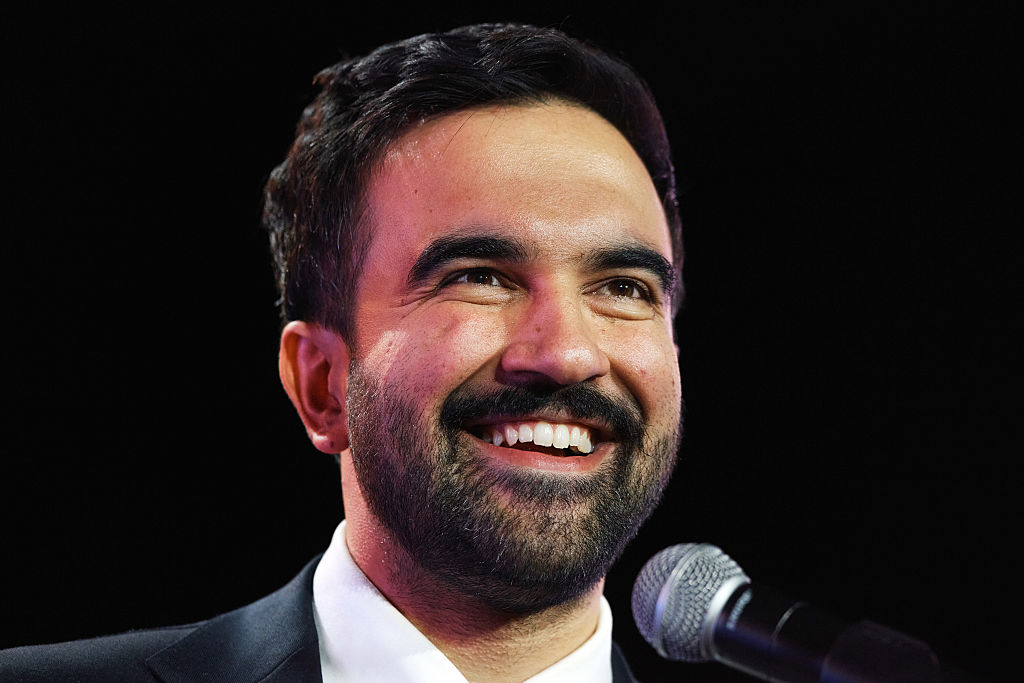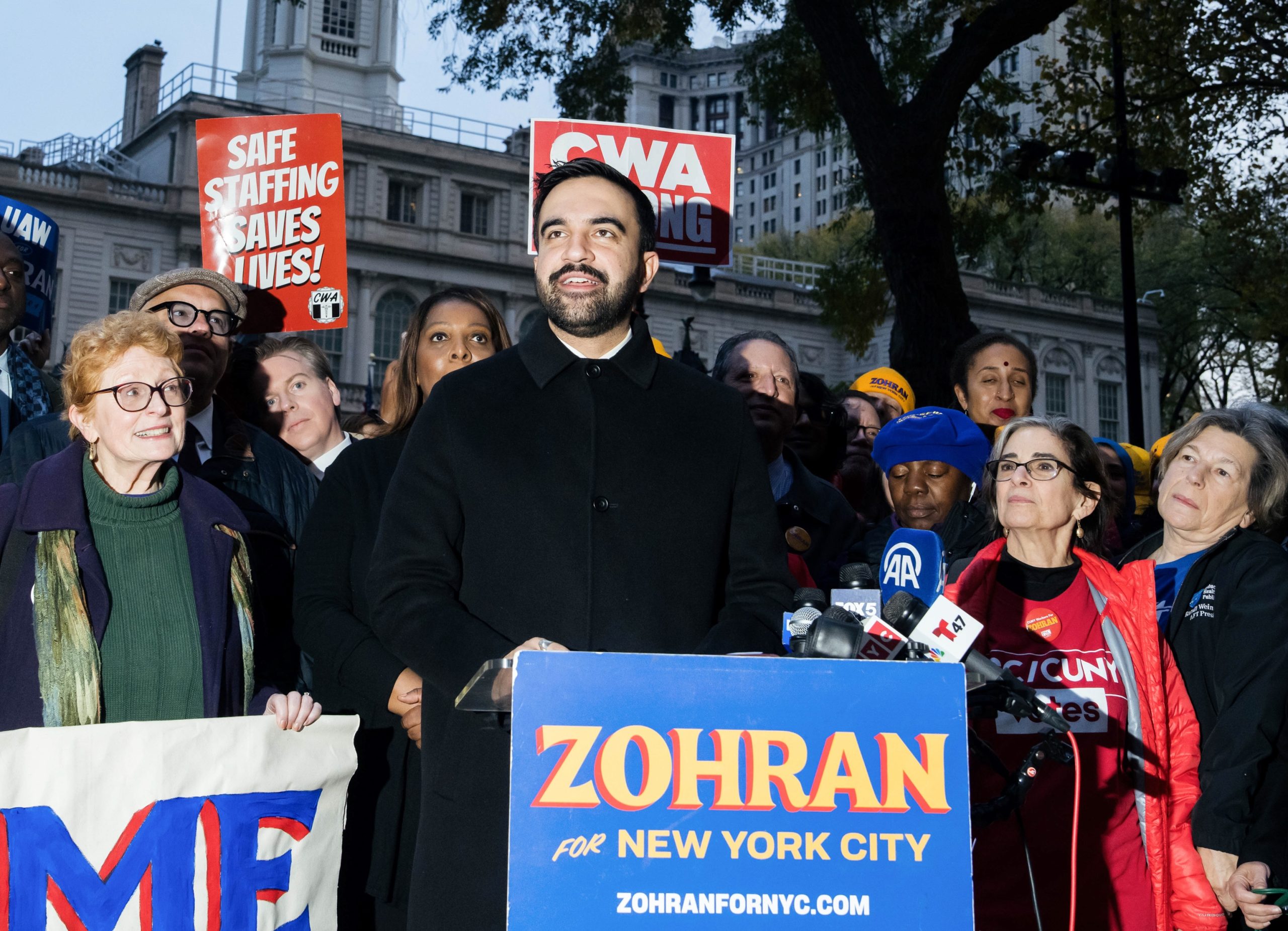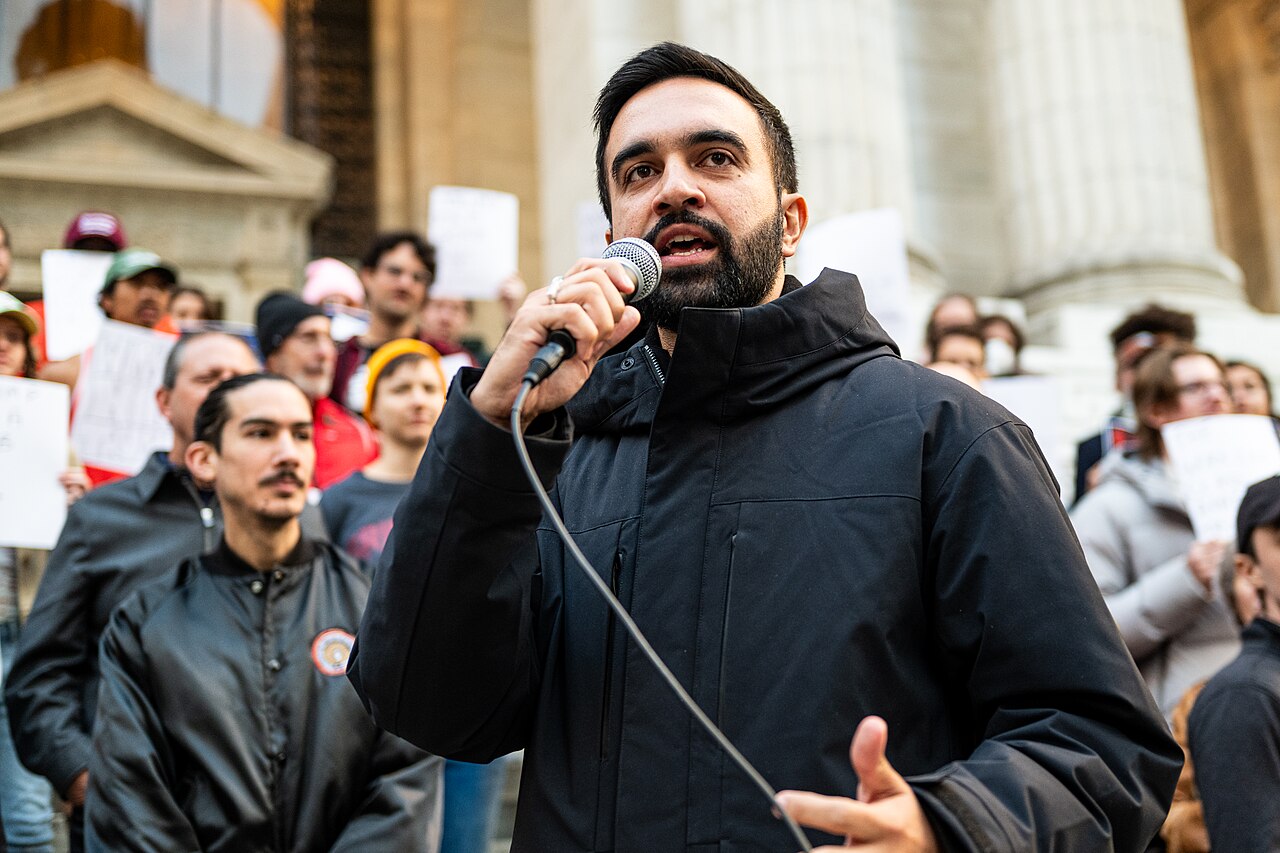Jacobin Has Charted Zohran Mamdani’s Rise From the Beginning
From our first interview immediately after he won his state assembly election in 2020 through profiles, op-eds, interviews, and speeches, Jacobin has closely covered Zohran Mamdani’s political career rooted in the socialist movement since its start.

Jacobin has charted Zohran Mamdani’s political journey from little-known assemblymember to mayoral front-runner. (Andres Kudacki / Getty Images)
Sometime tonight, we will probably learn that democratic socialist Zohran Mamdani will be the next mayor of New York City. Since the thirty-four-year-old state assembly member became the Democratic nominee and front-runner in the race, the city and the American public broadly have become increasingly familiar with Mamdani, a largely unknown candidate who polled at 1 percent when he first launched his campaign a year ago. But Jacobin has been covering Zohran’s campaign from the beginning.
In fact, we’ve been publishing articles about and interviews with the would-be mayor since his victorious 2020 campaign for the New York State Assembly. We interviewed Mamdani just after he took office in 2021 as part of the wave of democratic socialists ― including himself, Phara Souffrant Forrest, Marcela Mitaynes, and Jabari Brisport ― who joined Julia Salazar in the state legislature that year.
We continued to catch up with Mamdani during his time in the legislature as the Democratic Socialists of America (DSA)–endorsed bloc in Albany grew and socialists established a foothold in the New York City Council. In August 2021, in what now feels like a taste of things to come, Zohran talked to us just after Andrew Cuomo resigned as governor and explained why he was hopeful about New York State’s post-Cuomo future, when he told us that “so much more is possible now that we have a New York without Andrew Cuomo as its governor.”
During his time in the state assembly, Mamdani championed many of the issues that have been central to his mayoral campaign, like robust support for Palestinian rights, fully funding public goods, and taxing the rich. In 2022, he spoke to Jacobin about his vision for improving New York City’s public transit, including a proposal for fare-free buses. In the summer of 2023, Zohran and Brisport proposed the Not on Our Dime legislation, which would remove the nonprofit tax status of any New York–based organization that funds illegal Israeli settlements in the West Bank — a campaign that Jacobin covered extensively, including the Israel lobby’s failed attempt to oust Mamdani and fellow socialists in Albany in retaliation for the bill and pro-Gaza advocacy.
Also in 2023, we interviewed Mamdani about another piece of state legislation he introduced, the Repeal Egregious Property Accumulation and Invest it Right (REPAIR) Act. The bill aimed to eliminate the tax status of Columbia University and New York University, which would raise hundreds of millions of dollars per year that could be used to fund the City University of New York, the city’s public university system that has been starved by austerity in recent years.

The Road to the Democratic Nomination
Zohran became a Jacobin contributor himself in September 2024 when, in the wake of the federal government revealing corruption indictments against Mayor Eric Adams, he wrote an op-ed arguing that Adams should resign immediately. Anticipating core themes of his own mayoral campaign pitch, Mamdani wrote:
New York’s working families are being bled dry by rent, energy bills, childcare costs, and groceries. They are the ones being pushed out of this city — and politicians backed by the price gougers will only make it worse. We need to build a political movement in this city that takes power back for the working class and delivers the kinds of transformative policies that can make life here not only livable but good.
Zohran announced his bid for mayor the following month, when he sat down with Jacobin columnist Liza Featherstone for an exclusive first profile (when it was still the case that everyone believed, as Featherstone put it, “Mamdani’s chances of winning the mayoralty aren’t great.”)
We’ve been following the mayoral race closely since then, charting Zohran’s rise from longshot candidate to a serious contender in the Democratic primary. The campaign inspired us to reflect more on the history of municipal socialism in New York City. Historian Joshua Freeman looked to wildly popular social democratic mayor Fiorello La Guardia as a source of lessons for a potential Mamdani administration.
We analyzed what has made Zohran’s campaign so successful, from its populist laser focus on affordability to its massive canvassing operation, to its Bernie Sanders–inspired communications strategy, to its success in winning over important labor unions. Mamdani has found favor with a wide audience — in part, we argued, because it persuasively articulated progressive, universalist stances on controversial topics, abandoning alienating left-wing rhetoric like “Defund the Police.”
During the primary, we also turned a critical eye to opponent Andrew Cuomo, reminding readers of his grotesque, scandal-ridden past and observing that he hardly deigned to appear in public despite running for mayor. But, we noted, that didn’t stop the New York Times, the Democratic establishment’s paper of record, from effectively endorsing Cuomo in a half-baked broadside against Mamdani.
The Socialist Mayor of New York City?
After Zohran’s shocking primary victory, we published several reflections on what lessons the Left, and the Democratic Party for that matter, might take from the campaign’s success. In a lengthy interview, leaders of the New York City chapter of DSA explained the important role DSA played in the win. And as the prospect of a Mamdani mayoralty has looked ever more likely, we’ve published on the challenges Zohran will face as mayor and how he and his supporters might confront them.

To overcome opposition to his program by the business elite and by conservative and “moderate” politicians, Jacobin contributors have argued, Mamdani will need the active support of strong grassroots organizations, including labor unions, and he will need to forge political alliances within the state and broaden his base of popular support. Social movements scholar Peter Dreier and historian Shelton Stromquist each mined the history of progressive and socialist municipal governance, in New York and elsewhere, for advice for Zohran and his movement.
We’ve covered President Donald Trump’s increasingly clear signals that he wants to stop the socialist candidate, and that he will do whatever he can to undermine Mamdani’s mayoralty should he win — including cutting off federal funds and even potentially arresting and deporting Zohran if his administration does not cooperate with Immigration and Customs Enforcement. In July, law professor Aziz Huq offered some ideas on how Mamdani and his allies might respond to such fiscal and legal attacks by the Trump administration.
Zohran received the backing of Bernie Sanders and Alexandria Ocasio-Cortez in the primary, and the country’s two most famous democratic socialists have continued to campaign for him. In September, Mamdani and Sanders held a rally together at Brooklyn College, the Vermont senator’s alma mater. The event symbolized a passing of the torch from Bernie to Zohran, who has become a standard-bearer of the American left’s post-Obama electoral insurgency — inheriting the movement’s promise as well as its challenges. At his address there, which we ran in full, and in his address at an October rally with New York attorney general Letitia James, which we also ran in full, Mamdani described the election as posing “a choice between democracy and oligarchy.”
Mamdani’s capture of the Democratic nomination obviously took the party establishment by surprise. Yet since the primary, more and more prominent Democrats have endorsed Zohran, including US House minority leader Hakeem Jeffries, New York State Assembly Speaker Carl Heastie, New York State Senate majority leader Andrea Stewart-Cousins, and Gov. Kathy Hochul. At a massive Mamdani campaign rally last month with AOC and Sanders, Hochul took the stage to address the crowd and was met with booming stadium-wide heckles of “Tax the Rich!” The uneasy alliance of Hochul and other Democratic leaders with Mamdani speaks to how the socialists Zohran, AOC, and Bernie have become popular faces of the party and de facto leaders of the opposition to Trump, as establishment figures like Jeffries and Chuck Schumer have essentially abdicated that role. In his address to the 13,000 gathered supporters that night, which we ran in full as well, Mamdani cast his campaign and its fight for affordability in terms of winning “freedom for all.”
Zohran’s rise also reflects the ascendance of a new electoral coalition, Corey Robin argues — an electorate, he writes, of “of immigrants, working-class people, many from South Asia, of Muslims, of students, of renters, of debtors, and more” who are struggling with the cost of living but who are also morally moved by the plight of Palestinians and other victims of imperialism and colonialism.
But the issue of Palestine is not the only area where Mamdani might turn the page on the politics of the past. The deeply intertwined corruption of Donald Trump, Eric Adams, and Andrew Cuomo, Robin argues, is emblematic of “a larger lawlessness that has set in among a ruling class that is one part oligarchy and one part sexual predators club” — an economic and political elite that engages in illegal self-dealing, fraud, and, yes, sexual assault with apparent impunity. Cuomo has been endorsed by Adams and, effectively, by Trump himself; Mamdani’s principled democratic socialist politics is a challenge to this shameless oligarchy.
We’re down to the final hours of the mayoral campaign, with Mamdani campaigning relentlessly across New York City. Late last week, as he spoke to overnight workers at LaGuardia Airport and a Queens hospital — workers who don’t often get courted by major political candidates, and certainly not while they’re working the late shift — Alex Press tagged along and mused about his appeal to the city’s working class and what a Mayor Mamdani might achieve.
If the polls are to be believed, Zohran Mamdani will defeat the oligarchy in today’s election. Jacobin has charted his political journey from little-known assemblymember to mayoral front-runner. We’ll be here too to cover what happens next.